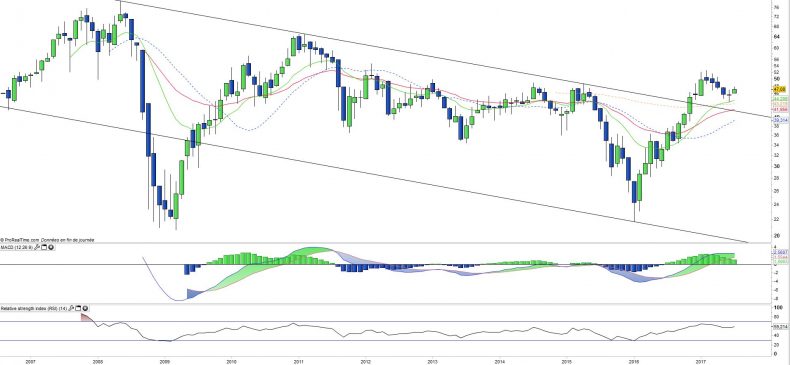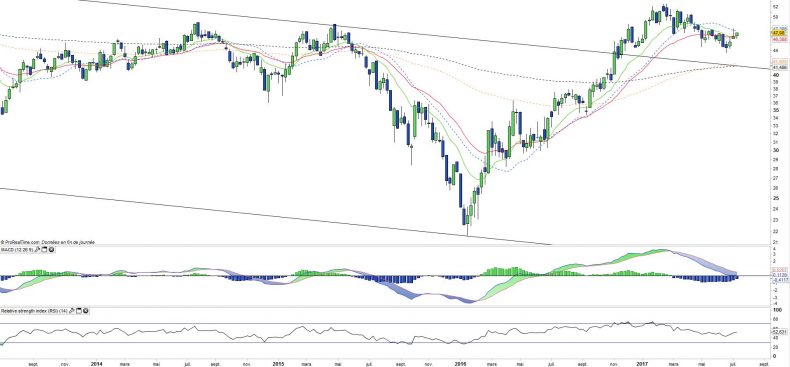Lyxor ETF Basic Resources - BRE - 11/07/2017
Short term strategy : Positive (60%) / Trend +
Long term strategy : Positive (95%) / Trend +
Characteristics of the ETF
BRE is in an ETF which tracks the Index Basic resources of the Stoxx600 index which is a fairly narrow, composed of 20 major mining companies.
The 3 largest mining companies, Rio, BHP and Glencore Billington represent more than 50% of the weight of the Index and are listed in £ on the LSE. These are diversified mining companies (iron ore, copper, coal...) with market capitalizations between €50 and 75 bn €. These companies are listed on European market places (especially London) but the mines are often located in Africa, Australia or in the Americas.
After some difficult years, commodity prices started to recover from the start of 2016, because of the reduction of capacity, (mainly in steel and aluminium) and optimism around Donald Trump's victory in the US presidential election, linked to the promise of a huge infrastructure programme, as main catalysts. However, price developments in 2016 major materials was fairly mixed and sometimes negative (aluminum, copper, etc.), with the exception of iron ore which rose significantly in the first few months of 2017, which is linked to Western anti-dumping measures impact on China. The current policy is keen to support China's economy (housing/construction in particular), in a specific political context (renewal of Mr XI by the communist party) and issued may therefore somewhat fragile.
Diversification is at the heart of the strategy of large mining companies wishing to rather developing capacity in the sectors of the future (Aluminum, copper, etc.) and the decrease in the sectors in difficulty (coal...). The sector depends on two major factors that are demand, in particular for infrastructure mainly from China and the US, but also major emerging markets such as India, but especially supply overhang so far. The scenario of a Chinese squeeze of capacity does not appear likely on the agenda, particularly in iron ore.
BRE is a very volatile support, which is highly sensitive to changes in demand but also adjustments to the offer. The 0.3% expenses are in the middle of our sample. Assets Under Management : 283 €M. After a drop of nearly 32% in 2015, BRE rose more than 64% in 2016 and 3% in 2017. The reflation theme of the global economy is positive for commodity and mining sectors, which explains the good recent performance.
Monthly data
The monthly chart shows a long term trend which has risen upward since the beginning of 2017, and was validated by a EMA 13x26 crossover. After the top in february 2017, the index has corrected sharply during the spring (-20%) but rebounded on its EMA13e and now seems ready for a 2nd wave of increases.
The oscillators are going in the right direction which completes the positive overview.
Weekly data
On the weekly chart, the bullish recovery seems less obvious, it is rather looking like bullish short term reaction which remains to be confirmed. The MACD configuration remains in a negative path while moving averages have joined and flattened, but seem prepared to shift in either direction.
The situation seems more fluid, while the prices have just go above average, a positive factor.
ETF Objective
BRE is a UCITS compliant ETF that aims to track the benchmark index Stoxx Europe 600 Basic Resources Net Return (20 companies)
Characteristics
| Inception Date | 25/08/2006 |
| Expenses | 0,3% |
| Benchmark | Stoxx600 Basic Resources Net Return |
| Issuer | Lyxor |
| Ticker | BRE |
| ISIN | FR0010345389 |
| UCITS | Yes |
| EU-SD Status | Out of Scope |
| Currency | € |
| Exchange | Euronext |
| Asstes Under Management | 283 M€ |
| Reolication Method | Indirect (via a swap) |
| Dividend | Capitalisation |
| PEA (France) | Yes |
| SRD (France) | Yes |
| Currency Risk | Yes (£/€) |
| Number of Holdings | 20 |
| Risk | 4/5 |
Country Breakdown
| United Kingdom | 28% |
| Switzerland | 15% |
| Australia | 14% |
| Finland | 11% |
| Luxembourg | 9% |
| Jersey | 4% |
| Sweden | 4% |
| South Africa | 4% |
| Norway | 3% |
| Others | 8% |
Sector Breakdown
| Materials | 97% |
| Energy | 3% |
Top Ten Holdings
| Rio Tinto | 22% |
| Glencore Xstrata | 15% |
| BHP Billiton | 14% |
| UPM-Kymmene | 6% |
| ArcelorMittal | 6% |
| Anglo American | 6% |
| Mondi | 4% |
| Randgold Resources | 3% |
| Norsk Hydro | 3% |
| Stora Enso | 3% |


